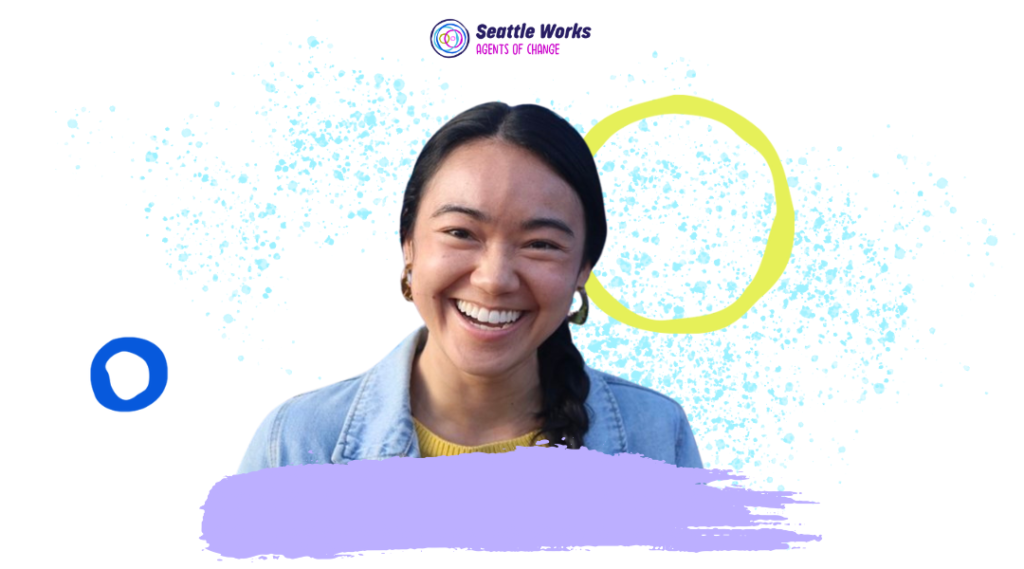
By Cassie Whitebread
September 2023
After close to four years, it’s time for me to say goodbye to Seattle Works. Deciding to leave this amazing organization was an incredibly difficult decision as this was the org that got me through the worst of a global pandemic, that allowed me to take part in embodying a shared leadership structure on staff, and the workplace that I’ve felt (by far) the most liberated in.
In 2020, just a few months into my position as Seattle Works’ program coordinator, COVID-19 emerged and put an abrupt halt to all our in-person programming. Most of my work revolved around these programs and I was suddenly left with lots of time on my hands and an unrelenting nervousness around the pandemic’s impact on the work. At the time, Seattle Works had recently implemented a strategic goal to incorporate antiracism education into all our programs and I felt passionate about enacting that. Historically, our programs centered (white) volunteers and their experiences, rather than the communities we worked with, and antiracism education was nowhere to be found. It was a ripe time for us to shift from volunteerism to collectivism, and as our small and majority-BIPOC staff began to share power more equitably, I had the opportunity to dream up a new program: Agents of Change.
Through this piece, I will share why I needed to create this space, how it was done, and its necessity in the movement for collective liberation.
My experience as a biracial Asian American woman working in predominantly white institutions is directly tied to why I dreamed up Agents of Change. I’ve experienced an immense amount of harm from the daily microaggressions, including regularly being confused for the other ANHPI person on staff, to being ignored and left out of conversations, to being gaslit and seen as the problem woman of color when I called out racist practices and behaviors and voiced a need for culture change. I’ve found that this individual experience resonates with many People of the Global Majority in the nonprofit sector, particularly in the Pacific Northwest, where toxic work environments thrive on the passive norms and worship of white dominant culture. Witnessing this shared experience and harm, I aspired to put my education background to use and create a majority-BIPOC space for folks to be validated in their experiences and collaborate on ways to sustain ourselves in the work while learning some skills along the way to push for culture change. My personal drive to create AoC was conveniently unfolding as Seattle Works was shifting our mission, vision, and values to center collective liberation work. The curriculum I imagined was perfectly aligned with this new organizational identity and opened the door for my eight-week cohort-based program rooted in antiracist and anti-oppressive practices to be born.
While designing the program, I constantly reflected on adrienne maree brown’s concept of fractals—the relationship between small and large patterns that are similar across different scales. In their book, Emergent Strategy, brown reflects on the individual impact,
“What we practice at the small scale sets the patterns for the whole system”
I thought about how organizations are made of individuals and that individual transformation can positively impact an organization’s culture shift. This led me to intentionally design the curriculum to take participants on a journey from internal to external. The first few sessions took the cohort on an internal deep dive to illicit self-reflection:
- What biases do they hold?
- What is their relationship to power and privilege?
- What’s their relationship to feedback?
- What traumas do they need to unpack and heal?
The latter sessions encouraged participants to look outward at their organizations:
- What is the current culture and structure of their organization (despite what an org chart might say)?
- In what ways does their organization uphold and perpetuate white-dominant norms?
- How could their board members and volunteers utilize an antiracist and anti-oppressive lens to their work?
I decided on a cohort-based structure to allow for ample time to connect and build relationships. This stemmed from my desire to combat one-off or short-term DEI educational opportunities that often left me feeling isolated and not a part of the collective of people working toward creating a more liberated sector. Additionally, it felt critical that this be a BIPOC-majority space, because that is so rare in nonprofit workshops and trainings. To ensure accessibility, we implemented a sliding-scale payment structure based on individual identity and organization budget (huge shoutout to Amanda Brown for supporting the research and evolution of our sliding-scale option for all our programs). Finally, I wanted the cohort to represent all connection points in nonprofits—board members, program coordinators, managers, executive directors, volunteers, and more.
Of course, launching Agents of Change came with challenges. Pretty early in the design process, an internal bump in the road came from our board of directors. When I introduced AoC to our board in 2020, many did not see this program as “mission-aligned” despite the organization having recently implemented a strategic goal to “incorporate antiracism education into all of our programming”. This issue, alongside other culminating factors related to our organization’s antiracism and anti-oppression journey, resulted in 80% of our board members resigning. While this was incredibly difficult at the time, our staff knew the importance of our journey and that those who didn’t see the significance in the movement for collective liberation could—and should—leave.
After a few iterations of the cohort, another challenge arose from a participant’s feedback. Over and over, cohort members shared the importance of this program and how incredibly nourishing and motivating it was to be able to dive into significant topics in a brave space with others looking to create change. BUT, we also heard from predominantly BIPOC participants that despite the fact that they learned a lot in the cohort, they faced barriers from their white leadership to actually operationalizing anti-oppressive practices at their respective organization. Many people shared that they wished their white executive directors and board members would participate in AoC. While we did have a number of white EDs and board members participate in AoC, it got me thinking about a similar cohort-based program that was just for white executive leaders. A space to learn about what it actually means to share power and take part in anti-oppression work (rather than block, ignore, or distract from it). I chose to collaborate with Amanda Brown and Shona Kerrick to modify the AoC curriculum and create the White Caucus Cohort. In this space, solely white people in positions of power participated to work together to support culture change within their own organizations—a space for them to do this learning without putting the burden on BIPOC colleagues.
It truly takes a village to engage and enact an anti-oppressive lens to the work and beyond.
I want to give a huge shoutout to all who inspired, encouraged, and supported me during my time at Seattle Works. A huge shout out to all the AoC alumni—there wasn’t a session that went by where I wasn’t learning something from y’all. Thank you to the guest speakers we’ve had throughout the years: Vu Le, Liz Derias, Czarina Ramsay, Ananda Valenzuela, Roshni Sampath, and Ben Reuler. Thank you to Crissi Mora for championing the program with our funders, LaTashia Treise for bringing your expertise from the Evolve Board Training to each cohort, and Amanda Brown for ensuring the backend tech runs smoothly. Big hugs and a colossal shoutout to Shona Kerrick and Pj Bergstrom, the amazing humans who will continue to facilitate AoC when I leave.
As I reflect on my time at Seattle Works, I feel immense gratitude for my time at an organization where I was able to run with my passion. Creating spaces like AoC to process, cocreate, soundboard, and reimagine outside of our respective organizations was so healing for me personally and absolutely necessary collectively. As I gear up for the next chapter in my journey, I’m brought back to Emergent Strategy and the important truth that
“our own lives and work and relationships [are the] front line, a first place we can practice justice, liberation, and alignment with each other and the Planet”.
In community,
Cassie

